#scalable tech stack
Explore tagged Tumblr posts
Text
Choosing the Right Tech Stack for Long-Term Scalability
When launching or scaling a digital product, your tech stack is more than just a list of tools — it’s the foundation your entire business will be built on. In 2025, the pace of innovation, user expectations, and performance demands mean you must choose your stack with long-term scalability in mind.
0 notes
Text
From Startup to Scale: A No-Nonsense Guide for Real-World Growth

Let's be real, choosing a tech stack is like picking what to eat at an all-inclusive resort. There are so many options, and while it might seem tempting to just pile everything onto your plate, you know that's a recipe for disaster. Similarly, you can't just pick every trendy tool out there for your business. If you do, you might end up with a bloated, dysfunctional mess that doesn't do anything particularly well.
The goal here is to help you pick the right tech stack for your business, allowing it to scale efficiently without giving you heartburn. Whether you're a startup just figuring things out or an enterprise looking to streamline, this guide is for you.
The Tech Stack Basics: What Are We Even Talking About?
Let's get one thing straight: a "tech stack" is not a literal pile of technology (though that would be cool). It's the tools, programming languages, and frameworks your business uses to build and run applications. Think of it as your company's digital toolbox. And just like with real tools, you don't use a chainsaw to assemble IKEA furniture—so you need to pick the right tools for the job.
Your tech stack is always divided into two parts
Front-end
This is the stuff your customers see and interact with. It's like the shiny chrome on a sports car—it looks nice, but if it doesn't perform well, people will quickly notice.
Common tools: React, Vue.js, HTML, CSS
Back-end
This is the engine of your operation. The invisible stuff powers your business and keeps everything running smoothly.
Common tools: Node.js, Python, Ruby on Rails
But enough with the definitions—let's get into how you can pick the right tech stack for your business. Spoiler alert: there's no one-size-fits-all answer.
Start with your Business needs (not your cousin's tips)
It's tempting to go with whatever your cousin or that random guy on LinkedIn is raving about, but let's be honest—just because a tech tool works for them doesn't mean it's the right fit for you. Would you wear your cousin's jeans? No. So don't copy their tech stack, either.
First things first: what are your actual business needs? Are you a startup trying to build the next Uber for cat-sitting (we've all thought about it), or are you an established company looking to streamline operations? Here's what you need to consider
Your Growth Goals
Are you planning for world domination or just happy to expand locally for now? The tech stack you choose should support both your short-term needs and long-term aspirations.
Your Industry
What industry are you in? If you're in e-commerce, you'll want tools that make online transactions easy and secure. In healthcare, you need technologies that comply with privacy laws like HIPAA. And if you're in finance, good luck with that.
Your Team's Skillset
Who will be using this tech stack? If your team is fluent in Python, don't make them suddenly learn Ruby on Rails unless you want a mutiny on your hands. Pick tools that fit your team's existing skillset—or be prepared to invest in serious training.
Think About Scalability (Because Growth Happens Faster Than You Think)
One minute, you're a cozy little startup, and the next thing you know, your app has gone viral, and your server has crashed more times than you can count. Growth is exciting, but if your tech stack can't handle it, you will have problems. Big ones. Scalability is the magic word here. You need a tech stack that evolve with your business, not one that buckles under pressure. When considering scalability, here is what you need to know
Cloud-Based Solutions
Hosting your infrastructure on cloud platforms like AWS or Microsoft Azure can give you the flexibility to scale up or down based on demand. It's like adding more chairs to the table when unexpected guests arrive—except, in this case, thousands of users are hitting your platform all at once.
Performance
Some programming languages and frameworks are great for large-scale operations. If you're dealing with a high volume of transactions or users, choose something built for speed. Node.js, for example, is known for handling multiple connections simultaneously, making it great for real-time applications like chat apps or online games.
Database Choices
Your database is where all the magic (or chaos) happens. For startups, a simple database like MySQL or PostgreSQL might be enough. Still, as you grow, you'll need something that can handle larger data loads—think MongoDB for non-relational data or Oracle for enterprise solutions.
Don't Forget About Integration (Because No One Likes a Silo)
Ever tried to put together a jigsaw puzzle where none of the pieces fit? That's what it feels like when your tech stack doesn't integrate well with your existing systems. And trust me, nothing grinds productivity to a halt faster than a bunch of disjointed tools that refuse to work together.
When choosing your tech stack, consider how it will integrate with the tools you already use. Does your CRM need to interact with your email marketing platform? Are you planning on syncing your sales data with your accounting software? The right integrations can save you hours of manual work—and possibly your sanity.
Here's the secret sauce: APIs (Application Programming Interfaces). They're like the universal translators of the tech world, helping different tools communicate with each other. When evaluating a new tool, check if it has an API that plays nicely with your other systems.
Example: HubSpot is a great all-in-one marketing platform that integrates with dozens of other tools. HubSpot's smooth integrations can make life much easier if you're already using a CRM or email marketing service.
Budgeting for your Tech Stack (Spoiler Alert: It's going to cost way more than you Thought)
Let's talk about money. Every business has a budget—unless you're backed by a billionaire who's just in it for the fun, in which case, please introduce me. For the rest of the world, picking a tech stack means balancing performance, scalability, and cost. You don't want to go broke paying for shiny new tools that only make things marginally better. Here's the deal: open-source technologies like React or Node.js are great because they're free. Yes, free! But there's a catch-free doesn't always mean zero cost. You must still consider maintenance, updates, and the cost of developers who can work with these tools.
The Airbnb Approach for cost saving
Take Airbnb, for example. The company used Ruby on Rails for its web platform in its early days. Rail is an open-source framework that helped Airbnb get started without sinking too much money into licensing fees. As the business grew, the team heavily invested in infrastructure and switched to React for the front end to handle the scaling needs of their user base. The lesson here? Start small with cost-effective solutions, and be prepared to invest in your tech stack as you grow.
Now, let's talk about enterprise-level tools. These often come with hefty licensing fees. If you're considering Salesforce or Oracle, know you're entering premium territory. These tools provide advanced features, but they come at a price. If you're a small business, this might not make sense yet—but for larger operations, these solutions can pay off in the long run by streamlining processes and reducing human error.
Shopify's Early Tech Stack Struggles
Shopify initially relied on PHP and MySQL to power its platform, which worked fine when serving smaller e-commerce stores. But as it scaled, it ran into performance issues with large traffic spikes. Shopify then transitioned to Ruby on Rails and focused on horizontal scaling to handle requests more efficiently. The learning is that budgeting for future growth and tech debt will save you headaches later.
Make sure your Stack is secure (or pay the price later)
We've all seen those scary headlines: "Massive Data Breach Exposes Millions of User Accounts." No one wants to be the next headline, especially when the damage to your reputation (and your wallet) can be severe. Security must stick in your mind when choosing a tech stack.
Some technologies are more secure than others. For instance, large enterprises often favor Java for its robust security features. Similarly, Python has excellent libraries for encryption and data security.
But security isn't just about picking a tool; it's about implementing the right practices. Ensure your developers regularly update your tech stack, apply security patches, and follow best practices like two-factor authentication (2FA) and encryption for sensitive data.
Target's Massive Data Breach
Remember Target's massive data breach in 2013? Hackers were able to access 40 million credit card numbers just because of a vulnerability in their network access system. They may have avoided that disaster with more secure protocols and better monitoring practices. Don't be like Target.
Keep an Eye on Trends, But Don't Chase Every Shiny New Tool
The tech world is always changing. Every week, a new "next big thing" promises to revolutionize how we do business. Blockchain, quantum computing, AI, Web3—it's easy to feel FOMO when you hear about these groundbreaking technologies. But just because something is trendy doesn't mean it's the right fit for your business.
The Slack Boom
Look at Slack. It became the go-to communication tool almost overnight, pushing out older tools like email and Skype. It was not only because it was shiny and new. It was because it effectively solved a pain point for businesses, making communication faster and more collaborative. However, not every tool has a lasting impact, like Slack, so pick your tech wisely.
That said, you want to pay attention to trends. In an industry where innovation is key, like fintech or healthcare, you may need to adopt new technologies faster than others to stay competitive. The trick is to strike a balance—stay current without feeling like you must overhaul your tech stack every six months.
The Talent Factor (because even the best Tech is useless without the right people)
You could have the most advanced, scalable, and secure tech stack on the planet, but you're sunk if no one on your team knows how to use it. When choosing your tech stack, consider the talent pool. Can your current developers work with this stack? If not, are you willing to invest in training or hire new developers specializing in those tools?
Netflix's Engineering Talent Strategy
Everybody knows it: Netflix hires the best engineering talent to manage its complex tech stack, which includes everything from Java and Node.js to Kubernetes and AWS. By focusing on hiring top-notch developers, Netflix ensures that their tech infrastructure runs smoothly, scales efficiently, and adapts to new trends.
But let's be real: hiring top tech talent is tough, especially if you're not on Netflix. Tha's why choosing a tech stack that aligns with your team's existing skills is smart. If your team is well-versed in JavaScript, don't force them to learn Python unless there's a compelling reason to switch. You'll save time and money and avoid unnecessary headaches.
Future-proofing your Tech Stack (because the future is coming whether you're ready or not)
Ah, the future. It's unpredictable, exciting, and a little terrifying. When choosing your tech stack, you want to pick tools that will grow with you and adapt to future innovations. No one wants to be stuck with a tech stack that becomes obsolete in two years.
Adobe's Move to the Cloud!
Take Adobe, for example. A few years ago, they shifted from selling standalone software (like Photoshop) to offering Adobe Creative Cloud. This switch to a subscription-based model helped them scale and ensured they could keep up with the industry's shift to cloud computing. They might have fallen behind if they had stuck with the old model.
So, how do you future-proof your tech stack? Look for tools that are modular and flexible. Think of Microservices architecture as one that allows different parts of your system to scale independently. That way, when one part of your app becomes a runaway success (fingers crossed!), you won't need to rebuild your entire system to handle the load.
Concluding Thoughts: The Tech Stack Balancing Act
Choosing the right tech stack balances meeting your current needs, planning for future growth, and monitoring costs. But with the right approach, you can build a scalable tech stack that's secure, and ready to handle whatever comes your way. Remember, it's not about picking the shiniest or most popular tools—it's about finding what works for you and your team.
So, move forward and start building that tech stack! And if you ever get overwhelmed, remember that even Amazon started as a small online bookstore with a simple tech setup. They scaled, and you can, too!
We can put you on track!
Feeling a little overwhelmed by your tech stack choices? Don't worry—we're here to help. Contact our team today for a free consultation, and let's build the perfect stack for your business's future growth.
#tech stack#tech stack guide#business growth technology#scalable tech stack#tech stack integration#front end#back end#budgeting for tech stack#secure tech stack
0 notes
Text
Top 6 Custom Software Development Companies in Sweden
If you're searching for the top custom software development companies in Sweden, you're not alone. Sweden has quietly become a powerhouse for customized tech solutions, thanks to its innovation-driven ecosystem and strong developer community. With digital transformation moving at lightning speed, businesses need custom software that fits their exact needs. These companies offer more than just coding; they offer strategic, scalable, and secure digital solutions built for the future.
1. Systematiq – Business-First Software That Drives ROI
Headquarters: Stockholm, Sweden Team Size: 11–50
What They’re Known For:
Systematiq focuses on aligning software solutions with business goals. Their mantra is simple: build software that solves real problems and increases profitability.
Areas of Expertise:
Custom software development
Business process automation
Cloud-based platforms
Integration with legacy systems
Why Choose Systematiq:
Strong focus on long-term partnerships
Agile delivery with measurable business outcomes
Deep industry expertise, especially in logistics and manufacturing
Standout Stat: 90% of their clients return for ongoing development and optimization services.

2. Bluell AB – Clean Code, Scalable Systems, Real Results
Headquarters: Stockholm, Sweden Team Size: 40–50
What They’re Known For:
Bluell AB blends creativity with precision. From scalable web platforms to full-stack apps, Bluell delivers bulletproof custom software that’s ready for growth from day one.
Areas of Expertise:
Full-stack development
Mobile app development
Iot Products
Custom Software Development
Why Choose Bluell AB:
Known for delivering SEO-optimized, scalable, and maintainable code
Offers end-to-end product development, including UI/UX, DevOps, and QA
Great fit for startups, SaaS platforms, and healthtech solutions
Client Love: Clients often mention Bluell’s clear communication and lightning-fast execution.

3. Beetroot AB – Tech with a Human Touch
Headquarters: Stockholm, Sweden Team Size: 300+
What They’re Known For:
Beetroot isn’t just about custom software, it’s about creating a sustainable tech ecosystem. With a large distributed team, they scale fast and deliver consistently.
Areas of Expertise:
Dedicated development teams
Custom mobile and web apps
UI/UX design
Tech consulting
Why Choose Beetroot:
Socially responsible hiring model
Proven experience in sectors like edtech, medtech, and climate tech
Access to a large pool of developers across Europe
Standout Fact: Beetroot partners with universities to grow tech talent in emerging markets.

4. Innowise Group – Global Expertise, Local Delivery
Headquarters: Global (Strong presence in Sweden) Team Size: 1,500+
What They’re Known For:
Innowise offers the power of an enterprise-level team with the agility of a local agency. They combine global delivery models with a Scandinavian work ethic.
Areas of Expertise:
Enterprise software development
AI & Big Data solutions
AR/VR applications
Blockchain development
Why Choose Innowise:
Wide service range and vertical expertise
ISO-certified processes
Strong cybersecurity and compliance standards
Clients Say: Innowise is a solid choice for scaleups needing complex systems without sacrificing speed.

5. Unitspace – Speed, Flexibility, Innovation
Headquarters: Ukraine, with operations in Sweden Team Size: 50–100
What They’re Known For:
Unitspace builds with agility. They’re a great partner for fast-moving startups or enterprises that need fast MVPs and iterative scaling.
Areas of Expertise:
Cross-platform mobile apps
SaaS product development
UI/UX design and prototyping
Backend and API architecture
Why Choose Unitspace:
Rapid development cycles
Transparent communication and collaboration
Strong portfolio in fintech, healthcare, and marketplaces
Speed Stat: Average time to first release is under 90 days.

6. Tallium Inc. – Design-Led Custom Software for Modern Brands
Headquarters: Canada & Ukraine, servicing Sweden-based clients Team Size: 70+
What They’re Known For:
Tallium puts design first. Their custom solutions are tailored not just for function, but for beautiful, seamless user experiences.
Areas of Expertise:
Product design and UX strategy
Mobile and web development
Startup MVPs and enterprise tools
Product audits and consulting
Why Choose Tallium:
Award-winning design team
Deep product thinking from ideation to scale
Great track record with Nordic clients
Noteworthy: Tallium has helped over 40 startups launch products that raised funding within the first year.

Conclusion
Custom software development in Sweden is thriving—thanks to a unique blend of talent, innovation, and technical excellence. Whether you’re a startup looking to build your MVP or an enterprise upgrading legacy systems, one of these six companies can guide your journey.
Pro Tip: Don’t just pick based on size. Choose a partner that aligns with your culture, communication style, and long-term product vision.
#custom software development#software companies Sweden#app development Sweden#Swedish developers#full stack Sweden#enterprise software#scalable tech solutions
0 notes
Text
Data Unbound: Embracing NoSQL & NewSQL for the Real-Time Era.
Sanjay Kumar Mohindroo Sanjay Kumar Mohindroo. skm.stayingalive.in Explore how NoSQL and NewSQL databases revolutionize data management by handling unstructured data, supporting distributed architectures, and enabling real-time analytics. In today’s digital-first landscape, businesses and institutions are under mounting pressure to process massive volumes of data with greater speed,…
#ACID compliance#CIO decision-making#cloud data platforms#cloud-native data systems#column-family databases#data strategy#data-driven applications#database modernization#digital transformation#distributed database architecture#document stores#enterprise database platforms#graph databases#horizontal scaling#hybrid data stack#in-memory processing#IT modernization#key-value databases#News#NewSQL databases#next-gen data architecture#NoSQL databases#performance-driven applications#real-time data analytics#real-time data infrastructure#Sanjay Kumar Mohindroo#scalable database solutions#scalable systems for growth#schema-less databases#Tech Leadership
0 notes
Text
Custom Software vs. Off-the-Shelf Solutions: What’s Best for Your Startup?
Struggling to choose between custom software and off-the-shelf solutions for your startup? Explore the pros and cons of each option in our comprehensive guide, and discover which approach best aligns with your business goals and budget.
#advantages of custom software#advantages of off-the-shelf solutions#business process automation#business software#competitive edge software#cost of custom software#custom software#custom software advantages#custom software disadvantages#custom vs. off-the-shelf software#disadvantages of off-the-shelf solutions#hybrid software approach#integration solutions#it consulting services#it solutions for startups#off-the-shelf software benefits#off-the-shelf solutions#quick implementation software#ready-made software solutions#security in software solutions#software customization#software development for startups#software development timeframe#software scalability#startup software solutions#tailor-made software#tech trends for startups#technology stack for startups#technology strategy#proprietary software vs off the shelf software
0 notes
Text
🎬 Entertainment App Development Services: Build the Future of Digital Entertainment
In a digital-first world where users stream, binge, listen, and share content 24/7, the demand for entertainment app development services is skyrocketing. Whether you're launching the next Netflix, Spotify, or a regional OTT platform, a powerful entertainment app can place your content at the fingertips of millions.
This blog explores everything you need to know about building a successful entertainment mobile app—features, tech stack, monetization models, and how the right development partner can turn your vision into a captivating, scalable reality.
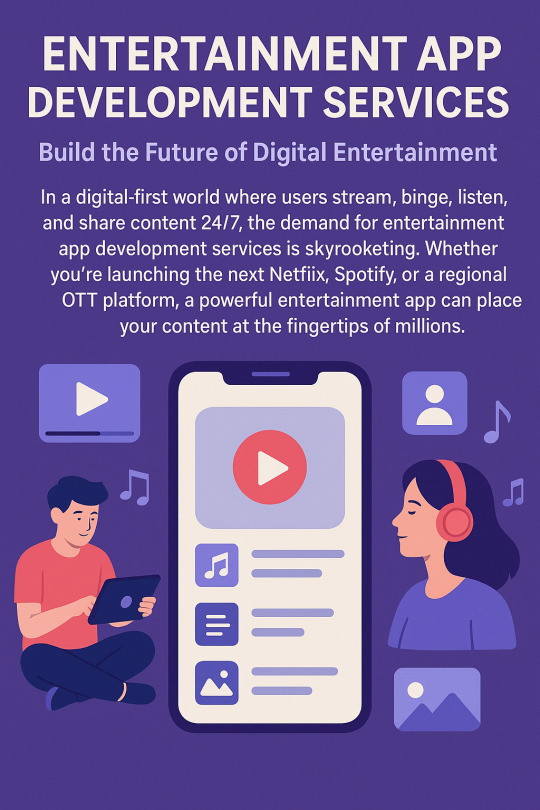
📱 Why You Need an Entertainment App in 2025
The entertainment industry is undergoing a massive digital shift. With over 6.5 billion smartphone users globally, streaming content—whether video, music, or live performances—has become the new normal. Audiences demand convenience, personalization, and immersive experiences, all of which can be delivered through a well-developed mobile application.
From OTT platform development to podcast and music streaming apps, custom solutions are now essential for media brands, production houses, indie artists, and entertainment startups.
📈 Market Stats Worth Noting:
The global video streaming market is expected to surpass $920 billion by 2030.
Time spent on entertainment and media apps increased by 40% post-pandemic.
Subscription-based platforms like Netflix, Hotstar, and Gaana have seen record-breaking growth.
If you're in the business of content creation or distribution, now is the time to invest in expert entertainment app development services.
🛠️ Core Features of a Winning Entertainment App
To compete with giants like Netflix, Spotify, or Amazon Prime, your app must go beyond basic functionality. Here's what users expect from a top-tier entertainment mobile app:
1. Content Streaming (Video/Audio)
High-quality streaming with adaptive bitrate, low buffering, and seamless playback across devices.
2. User Profiles & Personalization
Smart algorithms that recommend content based on watch history, preferences, or listening habits.
3. Subscription & Monetization Models
Support for freemium access, in-app purchases, advertisements, and recurring subscriptions.
4. Search & Filter
Powerful content discovery with keyword search, genres, languages, trending content, and more.
5. Multi-Platform Access
Cross-platform compatibility (Android, iOS, smart TVs, tablets, etc.) with a unified user experience.
6. Offline Downloads
Let users enjoy content without internet access by enabling secure offline downloads.
7. Live Streaming
Incorporate live shows, concerts, or podcasts with real-time chat and engagement.
8. Push Notifications
Keep users engaged by notifying them about new releases, trending content, and personalized suggestions.
9. Social Sharing & Integration
Let users share what they watch or listen to on social media, enhancing app visibility and virality.
🧠 Choosing the Right Technology Stack
Behind every great entertainment app is a powerful and scalable tech architecture. Here's what a reliable entertainment app development company should offer:
➤ Frontend (Mobile App Development)
React Native / Flutter for cross-platform development
Swift (iOS) and Kotlin (Android) for native apps
Custom UI/UX based on Figma, XD, or Sketch
➤ Backend
Node.js, Laravel, or Django for scalable API architecture
MongoDB or PostgreSQL for content and user data
Real-time databases like Firebase for chat, notifications, and analytics
➤ Streaming & CDN
Integration with AWS CloudFront, Vimeo OTT, or Wowza
DRM support to prevent piracy
Adaptive Bitrate Streaming (HLS, MPEG-DASH)
➤ Analytics & Recommendation Engine
Firebase, Mixpanel, or Google Analytics for user behavior
AI-powered recommendation engine to boost engagement and retention
💰 Monetization Strategies for Entertainment Apps
Monetization is crucial. Your entertainment app can generate recurring revenue through several models:
🔒 Subscription (SVOD)
Offer access to premium content on a weekly, monthly, or annual basis.
🎯 Advertisement (AVOD)
Free content monetized through banner ads, interstitials, or video ads using Google AdMob or Facebook Audience Network.
📥 Pay-per-view
Ideal for exclusive concerts, movie releases, or premium shows.
💼 Freemium
Provide basic content for free while charging for access to premium features or shows.
🤝 Why Hire Expert Entertainment App Developers?
Entertainment apps are high-stakes projects. Performance issues, bugs, or poor user experience can lead to instant churn. Here’s why hiring a team with domain expertise in entertainment mobile app development is critical:
They understand media licensing, content management, and user behavior.
They can optimize infrastructure for millions of concurrent users.
They’re familiar with UI/UX best practices that align with binge-watching or continuous listening behaviors.
They offer post-launch support for updates, bug fixes, and user feedback handling.
A team like Kickass Developers, with expertise in custom mobile app development, OTT app development, and audio/video streaming, ensures your idea is executed with precision and long-term scalability.
🚀 Final Thoughts: Your Entertainment App Is the Future of Engagement
Whether you’re building a regional OTT app, a music discovery platform, or a niche video streaming service, your success hinges on the right blend of technology, UX, scalability, and speed to market.
Investing in experienced entertainment app development services is your first step toward captivating your audience, building loyalty, and driving recurring revenue.
📞 Ready to Build Your Entertainment App?
Looking for a team that understands the entertainment industry inside and out?
Kickass Developers specializes in designing custom, high-performance entertainment applications tailored to your audience, brand, and growth goals.
📧 Contact us today at [email protected] 🌐 Or visit us at kickassdevelopers.com
#Entertainment App Developers#OTT App Development#Video Streaming App Services#Music App Development#Android Entertainment App#iOS Video App#Podcast App Developers#Live Streaming App Development#Subscription App Development
3 notes
·
View notes
Text
What is GoMining? – Real Bitcoin Mining Made Simple
In a world full of hype, tokens, and get-rich-quick schemes, GoMining takes a different approach: It lets you earn real Bitcoin from real mining power – no hardware, no technical setup, no noise, no heat.
Instead of buying and managing your own mining rig, you purchase a digital NFT miner. Each NFT represents actual hash power (measured in TH/s) that is backed by physical ASIC miners located in GoMining’s professional data centers.
How Does It Work?
You Buy Hash Power as an NFT – Each NFT Miner represents a specific amount of TH/s (e.g. 1 TH, 10 TH or more) – You own it forever, and you can upgrade it over time
It’s Hosted and Maintained for You – Your miner runs 24/7 in GoMining’s facilities – No energy bills, no setup, no tech knowledge needed
You Receive Daily Bitcoin Rewards – Rewards are paid out in BTC, based on the real output of your miner – Maintenance and service costs are automatically deducted, and fully transparent
What Makes GoMining Different?
🔹 True Ownership – You’re not just renting a miner; you own an NFT backed by physical infrastructure 🔹 Scalable – You can start small and upgrade at your own pace 🔹 Transparent Payouts – Every reward is traceable and shown clearly in your dashboard 🔹 Passive, Not Speculative – No trading required – just let your miner work for you 🔹 Low Barrier to Entry – Get started for less than $25
GoMining is built for long-term stacking – not gambling. It’s about consistent BTC accumulation over time, powered by real mining hardware.
💎 New User Benefits
• Start with a free 16 TH Task Miner (no purchase required) • Buy your first NFT Miner for just $24.99 • Use promo code ICjK3 to get +5% bonus TH on your first miner 👉 https://gomining.com/?ref=ICjK3
2 notes
·
View notes
Text
Crafting Web Applications For Businesses Which are Responsive,Secure and Scalable.
Hello, Readers!
I’m Nehal Patil, a passionate freelance web developer dedicated to building powerful web applications that solve real-world problems. With a strong command over Spring Boot, React.js, Bootstrap, and MySQL, I specialize in crafting web apps that are not only responsive but also secure, scalable, and production-ready.
Why I Started Freelancing
After gaining experience in full-stack development and completing several personal and academic projects, I realized that I enjoy building things that people actually use. Freelancing allows me to work closely with clients, understand their unique challenges, and deliver custom web solutions that drive impact.
What I Do
I build full-fledged web applications from the ground up. Whether it's a startup MVP, a business dashboard, or an e-commerce platform, I ensure every project meets the following standards:
Responsive: Works seamlessly on mobile, tablet, and desktop.
Secure: Built with best practices to prevent common vulnerabilities.
Scalable: Designed to handle growth—be it users, data, or features.
Maintainable: Clean, modular code that’s easy to understand and extend.
My Tech Stack
I work with a powerful tech stack that ensures modern performance and flexibility:
Frontend: React.js + Bootstrap for sleek, dynamic, and responsive UI
Backend: Spring Boot for robust, production-level REST APIs
Database: MySQL for reliable and structured data management
Bonus: Integration, deployment support, and future-proof architecture
What’s Next?
This blog marks the start of my journey to share insights, tutorials, and case studies from my freelance experiences. Whether you're a business owner looking for a web solution or a fellow developer curious about my workflow—I invite you to follow along!
If you're looking for a developer who can turn your idea into a scalable, secure, and responsive web app, feel free to connect with me.
Thanks for reading, and stay tuned!
2 notes
·
View notes
Text
Why Smart Startups Are Turning to David Brian Howard to Fix Their Sales Engines

In the high-stakes world of startup growth, few things stall momentum faster than a broken sales process. Founders often spend months perfecting their product—only to realize too late that they have no scalable way to get it into the hands of customers.
That’s where David Brian Howard comes in.
With over 12 years of experience in B2B sales and go-to-market execution, David Brian Howard has emerged as a trusted operator for SaaS companies and service-based startups that need more than advice—they need revenue. As the founder of Cadre Crew, a firm that builds virtual SDR teams and outbound systems, Howard has helped dozens of companies escape flatlined growth and get back on track.
His edge? He doesn’t chase hype. He builds systems.
The Problem: Startups Don’t Build Sales Engines—They Wing It
One of the most common mistakes Howard sees in early-stage companies is confusing traction with repeatability. A few warm intros and inbound leads might get you to $10–$30K MRR, but it won’t get you to scale.
“I’ve worked with so many founders who can sell the product themselves—but when it comes time to delegate sales, they have no process,” says David Brian Howard. “There’s no documented pipeline, no CRM logic, no messaging that converts cold leads.”
The result? Founder burnout, inconsistent revenue, and missed opportunities.
The David Brian Howard Playbook: Precision and Process
Unlike traditional consultants who offer generic advice, David Howard brings tactical execution to the table. He’s built and led sales teams, rebuilt broken CRMs, and launched outbound campaigns that actually generate meetings—with high-intent prospects.
At the core of his approach is a system he calls Precision Prospecting—a methodology that combines deep prospect intelligence, context-driven messaging, and automation that feels personal.
Here’s what it includes:
1. Smart Targeting
Before a single email goes out, David Brian Howard’s team maps buyer signals—funding events, tech stack changes, recent hires—and builds lead lists based on real purchase intent.
2. Relevance-First Messaging
Forget “Just checking in” or “Quick question.” Howard teaches teams how to craft outreach that speaks directly to the pain point—usually within the first two sentences.
3. Scalable Support
Through Cadre Crew, Howard supplies trained virtual assistants and SDRs who handle top-of-funnel research and outreach, freeing up closers to close.
It’s a model that delivers results quickly—without bloating headcount.
Real Results, Not Just Theories
In late 2024, a struggling SaaS company in Miami brought Howard in as interim head of growth. Revenue was stuck under $20K MRR. There was no outbound motion. The sales team was out of steam.
Within 90 days, monthly revenue tripled. Demo volume increased 218%. The founder was offloaded from daily sales for the first time since launch.
This wasn’t luck—it was a system. And it’s exactly what David Brian Howard installs for every client he works with.
Why Founders Trust David Brian Howard
Howard’s background isn’t theoretical. He’s built revenue from the ground up, sat in the sales seat, and knows what it takes to go from founder-led selling to scalable growth. His style is direct, data-driven, and built around action—not noise.
As more startups shift away from vanity metrics and toward sustainable sales, David Brian Howard is quickly becoming the go-to partner for founders who want to fix their funnel and grow with purpose.
2 notes
·
View notes
Text
Microservices vs Monolith: Choosing the Right Architecture

Content: When developing software systems, architecture is one of the first and most impactful decisions. Two primary models dominate: monolithic applications and microservices architectures.
Monoliths consolidate all functions into a single unit, making them easier to build initially. However, they often become cumbersome as the codebase grows, making deployments riskier and updates slower.
Microservices, on the other hand, break applications into independent services that communicate over APIs. Each service is loosely coupled, allowing teams to work independently, use different tech stacks, and scale specific components without overhauling the entire system.
However, microservices come with their own challenges: higher complexity, the need for service orchestration, and potential for network latency.
Choosing between monolith and microservices depends largely on your team's size, project complexity, and long-term goals. Companies uses tools like Software Development assist in evaluating your needs to design the most appropriate architecture, balancing scalability with simplicity.
Ultimately, it’s not about trends—it’s about choosing what fits your project’s current and future states.
Before jumping into microservices, ensure your team masters clean modular design within a monolith first—it’ll make the transition smoother if/when you need it.
3 notes
·
View notes
Text
Shopify App Development: Unlocking The Full Potential of Your Online Store

What is Shopify App Development?
Shopify app development involves creating custom applications that integrate seamlessly with Shopify stores. These apps can help store owners automate processes, improve customer engagement, optimize marketing, and enhance store performance. Whether it’s a private app for internal use or a public app available on the Shopify App Store, the right solution can significantly impact business growth.
Types of Shopify Apps
Public Apps — Available on the Shopify App Store, these apps are accessible to all Shopify merchants.
Custom Apps — Designed for a specific store, these apps are built to address unique business requirements.
Private Apps — Used within a single store and not listed on the App Store, these are ideal for businesses needing specialized functionalities.
Benefits of Shopify App Development
Enhanced Store Functionality — Custom apps allow store owners to integrate additional features beyond Shopify’s default capabilities.
Automated Processes — Reduce manual work by automating tasks such as order management, customer segmentation, and inventory tracking.
Improved Customer Experience — Features like chatbots, personalized recommendations, and loyalty programs can enhance user engagement.
Seamless Integrations — Apps can connect Shopify stores with third-party platforms such as CRM, ERP, and email marketing tools.
Key Considerations for Shopify App Development
Understanding Business Needs — Identifying gaps in your store’s functionality is crucial for developing an app that solves real problems.
Choosing the Right Tech Stack — Shopify apps are commonly built using Shopify’s API, Node.js, React, and Liquid.
App Security — Since apps handle sensitive customer data, security measures like data encryption and authentication protocols are essential.
Scalability & Performance — Ensure that your app can handle increased traffic and grow alongside your business.
How OyeCommerz Can Help with Shopify App Development

Our Shopify App Development Services
Custom App Development — Creating bespoke Shopify apps that cater to your store’s unique needs.
API Integrations — Connecting Shopify with third-party tools for better workflow automation.
App Maintenance & Support — Continuous monitoring and updates to ensure optimal performance.
UI/UX Optimization — Designing user-friendly interfaces for an enhanced shopping experience.
Conclusion
Investing in Shopify app development can unlock limitless possibilities for your eCommerce store. By leveraging custom apps, businesses can optimize operations, improve customer satisfaction, and drive revenue growth. If you’re looking to develop a Shopify app that aligns perfectly with your business needs, get in touch with OyeCommerz today!
2 notes
·
View notes
Text
What is Mern stack And Its importance? Before that I will Tell you the best institute for Mern stack course in Chandigarh.

What is Mern stack?
MERN Stack is a popular JavaScript-based technology stack used for building full-stack web applications. It consists of four key technologies:
MongoDB: A NoSQL database that stores data in a flexible, JSON-like format.
Express.js: A lightweight and fast backend framework for Node.js.
React.js: A front-end JavaScript library for building user interfaces.
Node.js: A runtime environment that allows JavaScript to run on the server side.
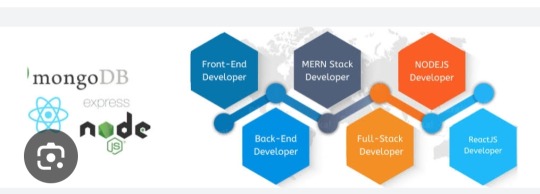
Importance of Mern Stack :
Full-Stack JavaScript – Uses JavaScript for frontend and backend, simplifying development.
High Performance – Node.js ensures fast, scalable applications.
Cost-Effective – Open-source, reducing development costs.
Rapid Development – React’s reusable components speed up UI building.
Flexibility – Suitable for web apps, SPAs, eCommerce, and real-time applications.
Scalability – MongoDB handles large data efficiently.
Strong Community Support – Large developer base ensures continuous updates and support.
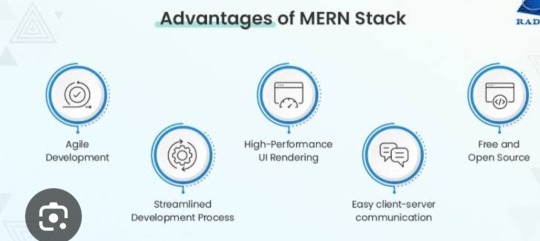
Now i will tell you the best institute for Mern stack course in Chandigarh .
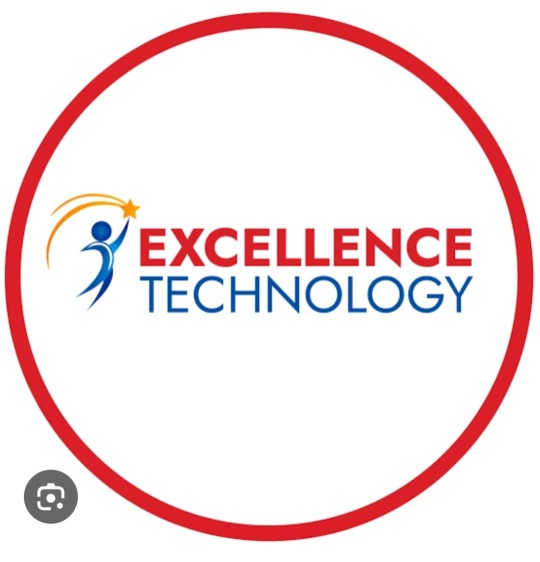
Excellence Technology is a leading EdTech (Educational technology) company dedicated to empowering individuals with cutting -edge IT skills and bridging the gap between education and industry demands. Specializing in IT training ,carrer development, and placement assistance ,the company equipts learners with the technical expertise and practical experience needed to thrive in today's competitive tech landscape. We provide IT courses like python ,Full stack Development, Web Design ,Graphic Design and Digital Marketing.
Contact Us for more details: 93177-88822
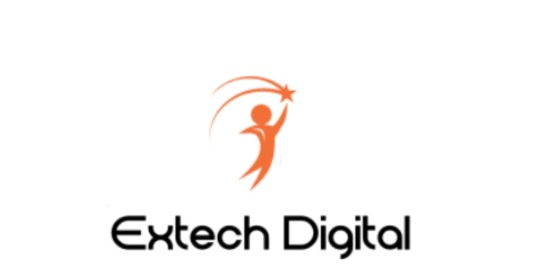
Extech Digital is a leading software development company dedicated to empowering individuals with cutting -edge IT skills and bridging the gap between education and industry demands. Specializing in IT training ,carrer development, and placement assistance ,the company equipt learners with the technical expertise and practical experience needed to thrive in today's competitive tech landscape. e provide IT courses like Python ,Full stack Development, Web Design ,Graphic Design and Digital Marketing.
Contact Us for more details: 93177-88822

Excellence academy is a leading software development company dedicated to empowering individual with cutting edge IT skills and bridging the gap between education and industry demands.specializing in IT training, career development, and placement assistance, the company equits learners with the technical expertise and practical experience needed to thrive in today's landscape. We provide IT courses like python, full stack development,Web design, and Digital marketing.
Contact Us for more details: 93177-88822
About Author
Nikita Thakur
Mern stack AI Developer/ 2+ years of experience
Excellence technology
Professional summary
Nikita thakur is a skilled MERN Stack AI Developer with over 2 years of experience at Excellence Technology. Proficient in MongoDB, Express.js, React.js, and Node.js, she integrates AI solutions to build scalable, high-performance web applications. Nikita excels in developing innovative solutions, enhancing user experiences, and driving business growth through technology.
2 notes
·
View notes
Text
How to Evaluate a Crypto Presale Before You Invest

Every week, dozens of new crypto presale token appear. Some promise the next decentralized revolution; others are simply vehicles for quick money grabs. With the explosive potential of presale tokens comes the responsibility to evaluate each project thoroughly before committing your capital.
In this article, we’ll provide a step-by-step guide to evaluating any crypto presale, so you can avoid scams, spot real value, and invest with confidence.
Step 1: Research the Team Behind the Project
The first sign of a legitimate crypto project is a transparent and experienced team.
Questions to ask:
Are team members publicly listed?
Do they have LinkedIn profiles or prior blockchain experience?
Have they worked on other successful crypto or tech ventures?
Are advisors credible and actively involved?
🚨 Red Flag: Anonymous teams with no public profiles or vague experience.
Step 2: Read and Understand the Whitepaper
The whitepaper is the blueprint of the project. Look for:
Problem Statement: What issue is the project solving?
Solution: How does their tech address the problem?
Technology Stack: Blockchain used, consensus, scalability.
Tokenomics: Total supply, allocation, use cases.
Roadmap: Realistic and actionable steps?
A solid whitepaper is clear, detailed, and logically structured.
🚨 Red Flag: Buzzword-heavy documents with no concrete roadmap.
Step 3: Assess the Tokenomics
Understanding tokenomics is vital to know how a token will behave after launch.
Key elements:
Total Supply and Distribution
Vesting Schedules
Staking and Utility
Liquidity Locks
Burn Mechanisms (if any)
🚨 Red Flag: Large allocation to the team or early investors with short lock-up periods.
Step 4: Analyze Community and Hype vs. Substance
Projects that succeed often have strong, organic communities.
Checklist:
Active Discord and Telegram channels
Engaged Twitter/X followers
Participation in AMAs or public events
Developer interactions on GitHub
Use tools like:
LunarCrush for social analytics
DappRadar for platform traction
TwitterAudit to check for fake followers
🚨 Red Flag: Inflated social media numbers with little genuine interaction.
Step 5: Check for Smart Contract Audits
Reliable projects often undergo smart contract audits by third-party security firms like:
Certik
Hacken
PeckShield
SlowMist
Audits highlight vulnerabilities and enhance investor confidence.
🚨 Red Flag: No audit, or a self-audit with no verifiable report.
Step 6: Study the Market and Competitors
Is the project entering a growing market or a saturated one?
Do a competitive analysis:
Who are the existing leaders?
What makes this project different?
Can it scale and sustain users?
🚨 Red Flag: No clear competitive advantage or differentiation.
Step 7: Evaluate the Launch Strategy
Is the presale happening via a reputable launchpad?
Is there a fair whitelist process?
Are there clear contribution limits?
Look at previous project launches on the same platform for performance benchmarks.
Step 8: Review Legal Compliance
A growing number of jurisdictions require:
KYC (Know Your Customer)
AML (Anti-Money Laundering) checks
Utility token classification
Registration with financial authorities
🚨 Red Flag: Avoid projects promoting anonymous investment or skirting regulations.
Step 9: Use Token Tracking Tools
TokenUnlocks.app – See token release schedules.
Etherscan/BscScan – Check contract activity.
CoinGecko/CoinMarketCap Presales – Monitor upcoming sales.
These tools help you verify data independently.
Step 10: Diversify and Invest Responsibly
Never go all-in on a single presale. Spread your risk across vetted projects and keep some funds liquid for safer bets.
Consider:
Allocation caps per project
Holding stablecoins or BTC/ETH as anchors
Exiting strategies if projects underperform
Conclusion: Presale Success Starts with Research
In the fast-moving world of crypto presale token, due diligence is the ultimate weapon. While the potential for outsized returns is real, so is the chance of loss — especially in a space where hype can outweigh substance.
1 note
·
View note
Text
𝗪𝗵𝘆 𝘀𝗲𝘁𝘁𝗹𝗲 𝗳𝗼𝗿 𝗹𝗲𝘀𝘀 𝘄𝗵𝗲𝗻 𝘆𝗼𝘂 𝗰𝗮𝗻 𝗵𝗮𝘃𝗲 𝗶𝘁 𝗮𝗹𝗹 𝘄𝗶𝘁𝗵 @gmtasoftware ? 😉
We build smart, scale-ready solutions — and yes, we stay after delivery too!
✔ Free 6-month maintenance ✔ Full-stack development support ✔ Agile, reliable & trusted by 30+ clients
💻 www.gmtasoftware.com — Let's talk tech!
𝗖𝗼𝗻𝗻𝗲𝗰𝘁 𝘄𝗶𝘁𝗵 𝘂𝘀 -: 📝𝗘𝗺𝗮𝗶𝗹 - 𝗶𝗻𝗳𝗼@𝗴𝗺𝘁𝗮𝘀𝗼𝗳𝘁𝘄𝗮𝗿𝗲.𝗰𝗼𝗺 🌐𝗩𝗶𝘀𝗶𝘁 𝘂𝘀- https://www.gmtasoftware.com/ 📞𝗖𝗼𝗻𝘁𝗮𝗰𝘁 - 0141-4022847
#GMTASoftware #AppDevelopment #WebDevelopment #CustomSoftware #AgileDevelopment #TechPartner #SoftwareSolutions #BusinessGrowth #FutureReady #ClientSuccess #DigitalInnovation #EndToEndSolutions #ReliableTech #ITServices #SmartDevelopment #StartupSupport #TrustedByClients
( GMTA Software, custom app development, web development, software solutions, agile development process, end-to-end project ownership, tech partner, 6 months free maintenance, trusted by clients, scalable software, mobile applications, web applications, startup tech solutions, enterprise IT services, digital transformation, reliable tech team, innovative software development. )
1 note
·
View note
Text
$AIGRAM - your AI assistant for Telegram data
Introduction
$AIGRAM is an AI-powered platform designed to help users discover and organize Telegram channels and groups more effectively. By leveraging advanced technologies such as natural language processing, semantic search, and machine learning, AIGRAM enhances the way users explore content on Telegram.
With deep learning algorithms, AIGRAM processes large amounts of data to deliver precise and relevant search results, making it easier to find the right communities. The platform seamlessly integrates with Telegram, supporting better connections and collaboration. Built with scalability in mind, AIGRAM is cloud-based and API-driven, offering a reliable and efficient tool to optimize your Telegram experience.
Tech Stack
AIGRAM uses a combination of advanced AI, scalable infrastructure, and modern tools to deliver its Telegram search and filtering features.
AI & Machine Learning:
NLP: Transformer models like BERT, GPT for understanding queries and content. Machine Learning: Algorithms for user behavior and query optimization. Embeddings: Contextual vectorization (word2vec, FAISS) for semantic search. Recommendation System: AI-driven suggestions for channels and groups.
Backend:
Languages: Python (AI models), Node.js (API). Databases: PostgreSQL, Elasticsearch (search), Redis (caching). API Frameworks: FastAPI, Express.js.
Frontend:
Frameworks: React.js, Material-UI, Redux for state management.
This tech stack powers AIGRAM’s high-performance, secure, and scalable platform.
Mission
AIGRAM’s mission is to simplify the trading experience for memecoin traders on the Solana blockchain. Using advanced AI technologies, AIGRAM helps traders easily discover, filter, and engage with the most relevant Telegram groups and channels.
With the speed of Solana and powerful search features, AIGRAM ensures traders stay ahead in the fast-paced memecoin market. Our platform saves time, provides clarity, and turns complex information into valuable insights.
We aim to be the go-to tool for Solana traders, helping them make better decisions and maximize their success.
Our socials:
Website - https://aigram.software/ Gitbook - https://aigram-1.gitbook.io/ X - https://x.com/aigram_software Dex - https://dexscreener.com/solana/baydg5htursvpw2y2n1pfrivoq9rwzjjptw9w61nm25u
2 notes
·
View notes
Text
How to Scale Your Business with On-Demand App Development Solutions
Scaling a business with on-demand app development solutions involves using mobile applications to expand service reach, manage increased demand efficiently, and enter new markets without significant physical infrastructure investments. These solutions provide the digital framework necessary for businesses to grow rapidly and adapt to evolving customer needs, allowing them to handle a larger volume of transactions and users seamlessly. By leveraging technology for immediate service delivery, businesses can achieve widespread accessibility and operational efficiency.
What is On-Demand App Development?
On-demand app development focuses on creating mobile applications that allow users to request and receive services or products instantly. These applications function as a direct link between consumers and providers, facilitating quick transactions and immediate fulfillment. Examples include platforms for food delivery, ride-hailing, and even professional services, all designed to offer convenience and speed. The fundamental concept revolves around meeting customer needs precisely when they arise, making services more accessible and efficient.
Why On-Demand Apps are Essential for Scaling
On-demand apps are essential for scaling because they remove many traditional barriers to growth, such as geographical limitations and the need for extensive physical infrastructure. They allow businesses to reach a broader customer base and manage increased service requests without a proportional increase in operational costs. A scalable on-demand app architecture ensures the application can handle a growing number of users and transactions smoothly. This digital approach to service delivery means businesses can expand their operations quickly and efficiently, adapting to market demand.
Key Features that Enable Scaling
To scale effectively, on-demand apps must incorporate certain key features. These include robust user management systems capable of handling a large number of accounts and transactions. Efficient real-time tracking for on-demand apps allows businesses to monitor service delivery and logistics, ensuring smooth operations even at high volumes. Automated dispatch and billing systems reduce manual effort and improve efficiency. A well-designed UI/UX design for on-demand apps is also important, as it ensures a positive user experience, which is crucial for retaining a growing customer base.

Benefits of Using On-Demand App Solutions for Growth
The benefits of on-demand app solutions for growth are substantial. They allow businesses to access new markets and customer segments that might be difficult to reach through traditional means. For example, businesses can explore how businesses use on-demand delivery apps to enter new neighborhoods or even cities without opening new physical locations. These solutions often lead to improved operational efficiency, as many processes are automated and streamlined. Benefits of on-demand apps for startups include the ability to quickly test market demand and scale their operations without significant upfront capital expenditures.
The On-Demand App Development Process for Scalability
The on-demand app development process, when focused on scalability, involves careful planning from the outset. This includes choosing the best tech stack for on-demand service app development that supports future growth. The process starts with a discovery phase to understand the business's scaling goals, followed by strategic planning for features and infrastructure. Development focuses on building a modular and flexible system that can easily accommodate new features and increased user loads. Rigorous performance testing is conducted to ensure the app remains responsive and stable under high demand.
Understanding On-Demand App Development Cost for Expansion
When planning for expansion, understanding the on-demand app development cost is crucial. This cost can vary significantly based on the complexity of desired features and the extent of customization. For instance, the cost to develop an on-demand grocery app in 2024 with advanced inventory management and delivery route optimization will be different from a simpler service app. Investing in custom on-demand app solutions can lead to higher initial costs but provides the flexibility needed for long-term scalability and unique business requirements.
Choosing the Right On-Demand App Development Platform for Growth
Selecting the appropriate on-demand app development platform is vital for ensuring scalability. Businesses often consider platforms like iOS and Android, or cross-platform solutions. Many companies opt for frameworks such as React Native for their scalability benefits. Why use React Native for on-demand apps? It allows for efficient development across multiple platforms from a single codebase, which can save time and resources when expanding. The chosen platform should support robust back-end services and cloud infrastructure to handle increased user loads and data traffic.
Leveraging On-Demand App Development Trends for Scale
Keeping pace with on-demand app development trends is important for sustainable growth. Current trends include the integration of artificial intelligence for personalized user experiences and predictive analytics, which can help businesses anticipate demand and optimize operations. The adoption of IoT devices for seamless interactions and enhanced security features are also significant. By incorporating these trends, businesses can ensure their on-demand solutions remain competitive and continue to attract new users, supporting their scaling efforts.
Sector-Specific Scaling: Uses of On-Demand Apps in Healthcare
In sectors like healthcare, on-demand apps offer specific avenues for scaling. The uses of on-demand apps in healthcare include expanding access to telemedicine services, enabling remote patient monitoring, and streamlining prescription delivery. This allows healthcare providers to serve more patients without necessarily expanding physical clinics. Top features to include in an on-demand healthcare app for scaling purposes involve secure data management, seamless video consultation capabilities, and efficient appointment scheduling, ensuring quality care even with increased patient volumes.
How Businesses Use On-Demand Delivery Apps for Broad Reach
Many businesses use on-demand delivery apps as a direct strategy for scaling their operations and extending their geographical footprint. These apps allow businesses to fulfill orders and provide services to customers far beyond their physical locations. Whether it's an Uber-like app development for transport or a step-by-step guide to create an on-demand taxi booking app, these platforms enable efficient last-mile delivery and service provision. The ability to manage a large fleet of drivers or service providers through the app is fundamental to scaling delivery operations.
How On-Demand Apps Improve Customer Experience for Larger Audiences
As a business scales, maintaining a positive customer experience becomes more challenging. However, on-demand apps are designed to improve customer experience, even with a larger audience. Features like real-time tracking, instant communication channels, and personalized recommendations ensure that each customer receives prompt and tailored service. This focus on individual experience, coupled with efficient service delivery, helps retain customers as the business grows. A seamless UI/UX design for on-demand apps contributes significantly to overall customer satisfaction, encouraging repeat use and positive word-of-mouth.
Ready to take your business to the next level?
Connect with a trusted mobile app development company today to explore custom on-demand app solutions tailored for your business's growth.
1 note
·
View note